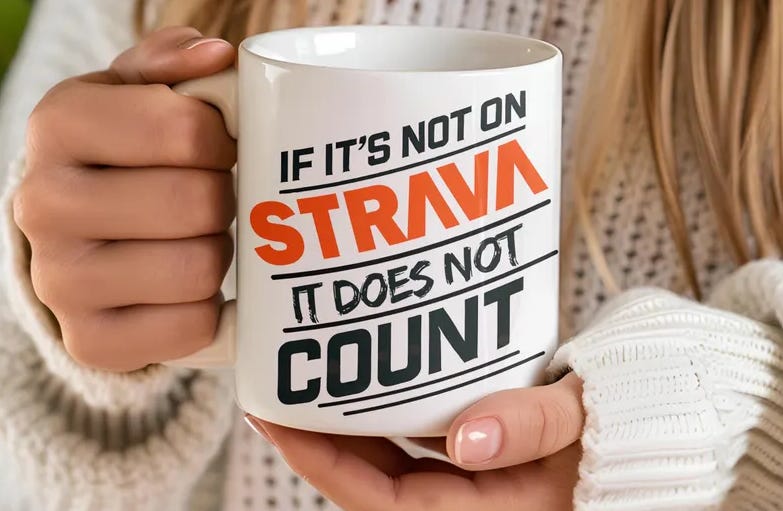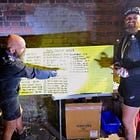Is it time to ditch 'compare and despair' inducing running social media?
Seth Werkheiser uses his Substack to help creative people leave platforms like Instagram and Facebook - and says runners could benefit too

‘If it’s not on Strava, it doesn’t count’.
It’s a phrase that adorns a thousand cups, coasters and t-shirts.
From parkrun to your local running club, people are starting their watches and phone apps with the aim of recording their runs and getting some much desired Kudos.
But is this rush for online gratification and love of data part of a wider problem? A societal issue that combines toxic addiction with the blight of unfair, and unachievable, comparison?
Is it just possible that there is a world where our runs don’t have to be on Strava? Or Tik Tok, Instagram, Facebook, X or whatever the latest social media toy sent to entrap us is?
Running’s ‘compare and despair’ problem on social media:

Seth Werkheiser is the author of the ‘Social Media Escape Club’ Substack newsletter, which looks at ways people can leave large scale platforms behind in favour of close-knit groups and email lists.
His articles explore why having a large following on social media platforms is often meaningless when it comes to real engagement or growing a business.
And as for running achievements being posted on platforms like Strava, he has no doubt about the negative effects it can cause.
Seth, who enjoys running on an amateur level, said the sport has a “compare and despair nature” when it comes to social media.
He said runners posting huge distances or fast times on Strava can provoke disappointment among their peers.
“I'll look at my own run and say, ‘oh man, my pace, look at me with this 13-minute pace’,” he said.
“I know that it doesn't affect me but there is a compare and despair thing out there.
“I've seen athletes talk about that on social media, saying others have more mileage, or that this athlete has this many followers and that many sponsors.
“They say, ‘I need more followers if I want to get what they have’.”

The problem is exacerbated by the way in which social media doesn’t necessarily promote the best people in a field, but celebrates those who can attract a following via their personality, looks, humour or simply the luck of the algorithm.
That means running influencers can have a greater following than professional athletes - or in the boxing world, that YouTubers are fighting as the headline act while skilled practitioners scrape out a living.
“It’s wild,” Seth said. “In the music world, there are these influencers on YouTube that react to music videos and play guitar.
“They have more followers than the bands they're talking about, but they're just sitting in front of a computer.
“They are making money while bands are out there recording. It becomes this idea of if you're good at the internet, you can be good at this thing.
“But if you're not good at the internet, it inhibits you and holds you back.”
From ‘geeky and nerdy’ fun to the cult of social media:
Seth is no Luddite. He has used a host of social media platforms over the years, even being an early adopter on Twitter back in 2006 when his was one of the first 3,000 accounts on the site.
He said social media started out as a “great, great concept,” while pre-Elon Musk Twitter allowed him to meet “great people” and build relationships online.
“I met amazing people when it started out because it was so geeky and nerdy,” he said. “Twitter started with shortcode stuff and there was a degree of it being for nerds or people smart enough to nerd around with that stuff.
“It was a very innocent time, with a lot of like minded people all in the same space.”
At that stage, Seth said, everyone was “cool and jolly and nice”.
Although he admitted not everything used to be rosy in the garden of social media, Seth told Running Tales the tipping point came in 2016 with the American election of that year between Donald Trump and Hillary Clinton.
He added that Facebook’s pivot to video in 2015 also perpetuated a “race to the bottom”.
Seth said these days so much of the content posted on social media finds its way into “an empty chamber” - even when it comes to accounts which have many thousands of followers.
“Social media is ingrained in so many people across so many different industries, and we’re asking ‘what’s everybody's doing on there, we can't leave it’,” he said.
“It’s as if it is the only way people can get the word out - like Instagram or Facebook or Twitter is the only way I can reach this massive level of people.
“And we just keep posting and throwing posts out there, because that's what we've been trained to do. People at these companies have ingrained it into us, they've educated us to be this way. They got paid a lot of money to do that.
“It’s really hard to stop. It's a cult. You try telling some people to get out of this and there is another way, and they'll say, ‘no, there's not, it's impossible’.
“But the numbers don't lie. That's my big thing. If you have 20,000 followers and get 12 Likes, what are you doing? That seems ridiculous.”
He pointed out that for businesses or people trying to make money off social media platforms, the ratios are even worse. While the proportion of Likes to followers may be low, the number of those Likes which are converted into sales can be tiny or, often, non-existent.
And, he added, this does not happen by accident.
Addiction, isolation and a giant teddy bear:
Seth, whose background includes founding Buzzgrinder - one of the longest-running MP3 blogs online, said the effect of social media on some runners and running influencers is similar to what he has seen with musicians.
While in the past people would be able to post something and get a reaction, with the noise on social media getting ever louder, it is becoming increasingly hard to find any cut through.
“It's not going to get any easier in 2025 to reach your fans,” he sad. “Today is as easy as it will ever be again, it's only going to get harder.
“2026 is going to be even harder and you're going to have to spend money, you're going to have to do new tricks, new things, deal with a new algorithm.”
He referenced the ‘enshittification of social media,’ a process whereby initially user-friendly online platforms decline in quality and become more and more focused on profit.
The theory was put forward by blogger and journalist Cory Doctorow. It features the idea that companies, including social media giants, are employing a ‘giant teddy bear gambit’.
It is based on the idea that at county fairs there will always be someone wondering around with a giant bear they have won. But, in fact, the game they were victorious in was probably rigged in their favour or their win was a one-off - and now the giant teddy is acting as “a convincer’ persuading other people to try their luck to win their own bear.
Seth said: “But it's so hard to win. They make it very hard to win but they give out evidence that says you could win this.
“And that's the thing with social media. All these influencers or athletes trying to get their stuff out there - of course, some of them are going to win. It's a lottery ticket.
“Sometimes some of those posts are going to hit and get a thousand Likes or get a bunch of clicks. They have to because if everything was just the base level of how it really works, no-one would do it anymore.
“It's all built on the premise of the casino. The casino has to pay out or else no-one's going to go to it. That's social media to a tee.
“We could keep posting and posting, and every now and again something will hit. I've known people that have won $500 on scratch off tickets, but that doesn't count for the two years previous that they kept pumping down $5 at a time - they probably spent a thousand dollars over those last two years.”
Seth added that like with casinos, social media can lead to addiction and loss: “It can and does pull people in. And that becomes the scary part, because it becomes like an alcoholic who can’t just have one drink.
“The isolating, toxic part of social media is that it says, ‘you're nothing without me’. And as an artist, as a musician, as maybe an athlete that has sponsorship deals, people are thinking, ‘I have to go on social media to keep this alive, there's no other way to do it’.
“And that's terrifying, and it keeps you in this toxic, abusive relationship.”
Small is beautiful - the power of community:

But are things really as bad as Seth makes out?
On Running Tales, we’ve previously featured articles from running influencers, bloggers and vloggers with incredible stories.
From David Abbott, aka Mr Slow Easy Comfortable, dispensing running tips or #goforarun influencer Jeremy Singh using social media to reveal how he went from an overweight dad to a six-time ultra marathoner, to the hilarious videos of Tim Stent, aka the Middle Aged Running Man, we’ve celebrated and championed those who have used social media to push their stories.
There are accounts on social media which promote running for all, herald the tales of athletes who run more slowly or are not the traditional size or shape runners might be expected to be, provide vital hints and tips to improve people’s performance, or - dare we say it - tell ‘the extraordinary stories of everyday athletes’.
Seth acknowledges some social media accounts have the power to provide such important information or host inspiring stories.
But he added that while that is valuable, much of the content on social media is “skewed so that the most loud, audacious person can talk about it and that becomes the thing”.
He said crazy theories or problematic fads are boosted by algorithms which promote negativity, false comparisons and poor training techniques.
He said: “I don't trust the algorithm to bring me the peaceful, calm, smart stuff.
“I believe and trust in people like yourself that write about and report on the sport, and trusted friends and colleagues who talk about it.
“This person over here, I like what they're talking about. And then you go there and you read their newsletter or their website, or maybe you watch their video and you’re like, oh, this is calm.
“They’re not blowing up because they didn't feed into the algorithm. But what they say is nice and calm.”
Seth said that by reading, watching, listening and engaging with sources within a circle they trust and resonate with, people can become less reliant on social media and algorithms.
“When someone tells you, ‘I’ve found this person and they have a lot of good advice’ then that’s cool,” he said.
“I’ll go and check that out, rather than listen to an algorithm which pushes someone’s video because they have 10,000 followers even though it’s garbage.”
Seth said the antidote to the allure of social media is to adopt a ‘small first’ mentality by giving priority to “people in run groups or book clubs”.
He added: “Maybe small is okay, maybe small is good. We don't need to achieve these big giant 10,000 figures followings or whatever.”
One of Seth’s favourite pieces of advice is for people to create targeted email lists, populated with people who really engage with content.
“I know people that have six figure Instagram followings who can't reach anybody,” he said.
“But then they have a small 6,000 person email list and they make money from it. That’s half their income for the year.
“We need to get away from these big, inflated numbers. It's all a big teddy bear.”
Can we exist without social media? Absolutely…

Through ‘Social Media Escape Club,’ Seth regularly advises people to step away from such platforms - his bio even says, ‘I help creative people quit social media’.
But he admitted his own relationship with socials is nuanced and “not black and white”.
Indeed, Substack itself has many of the characteristics of a social media platform, particularly when it comes to its Notes section.
“I'm not yelling at anybody to get off social media,” he said.
“Everyone’s on their own journey. For me, it was not a problem not to be on Tik Tok. I was never on Tik Tok.
“Twitter, for me, was hard to let go of. But do I believe we can exist without social media? Absolutely I do.
“There's so many ways that we can get in touch and build community and build audience and build a fan group around what we do without putting all our magic onto other people's platforms.”
Recently on the Running Tales Podcast:
Support Running Tales:
Please help us keep producing Running Tales across Substack and in podcast form:








For me, it's about 1) having a good understanding of social media and 2) then being selective.
For better or worse, runners love Instagram. It's a fantastic place to make real connection and then keep in touch over sharing a run etc - there's no better platform for that stuff imho. It's because it's visual, but let's not dwell on that 🤣
As a journalist, I think I have a good understanding of when something on IG is bluster and when it's genuine. I know when to take a pinch of salt. I know many do not, in which case Seth's advice is much more useful.
Community is where it is at. I was told by a brand that we didn’t have enough followers for them….it was a blow until I realized that we don’t have followers, we have community.
A space where people know people because of their stories and not a vanity metric.
I value the people in our circle and love chatting with them. There is a measurement of success there that a follower count will never be able to measure.